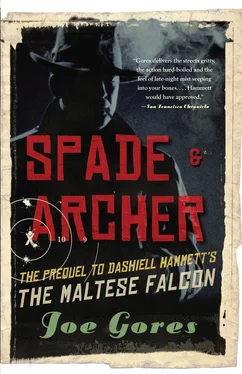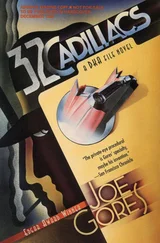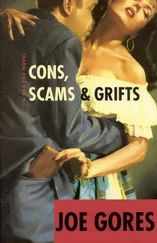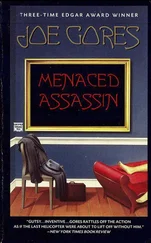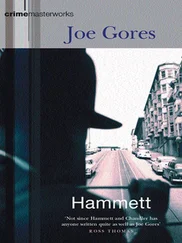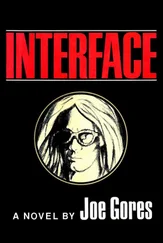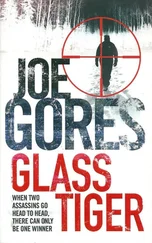Spade stubbed out his cigarette and tossed the butt into a trash bucket. As he spun Jerry a silver dollar, a man across the room yelled, “Boy, bring me a couple of fresh towels chop-chop!”
Spade stopped at the Neptune Bath House office, but nobody admitted knowing anything about the stranger who had been there on the day of Eberhard’s death. Eberhard had not formally signed him in as a guest so there was no record of him. They refused to name the other men in the group that day.
It was a four-story Pacific Heights brownstone, not quite a mansion, perched above the 2400 block of Broadway. Spade mounted a steep flight of stairs between trimmed boxwood hedges to a gleaming marble landing. The brass door knocker was polished to a high gloss. He used it.
After thirty seconds the ornate hardwood door was opened by a German woman in a maid’s uniform, unsmiling, eyes watchful, mouth determined. Spade removed his hat and proffered a card stating that he represented the Bankers’ Life Insurance Company.
He said pleasantly, “I have come concerning the policy we carried on the late Mr. Eberhard.”
“God rest his soul. I will see if Madame is at home.”
The door shut. Spade turned to look over Cow Hollow to the low whaleback hump of Alcatraz Island out in the bay. Below him a brown and white gaff-rigged ketch, made a toy by distance, was just entering the harbor between the long finger of jetty and the Marina Green. A dozen sailboats were in their berths at the San Francisco Yacht Club. The sun was still warm, but tendrils of fog were ghosting their way through the Golden Gate between Fort Point and the Marin headlands. A Matson steamship was heading out toward the open Pacific.
“Madame will see you now.”
On either side of the foyer, deeply carpeted, exquisitely appointed rooms fronting Broadway were illuminated by sunlight coming through open-curtained windows. Kitty-corner before one window was a Steinway baby grand with sheet music on its rack. Spade followed the German woman’s stout figure down a maroon hallway runner of intricate design. She knocked on the frame of an open doorway, stepped aside.
“You may go in.”
It was a library given over to dark leather-bound volumes. A woman sat in a leather armchair with an open book in her lap. A reading lamp was directed over her left shoulder, leaving her features in relative obscurity. On the reading table was a half-full cut glass cognac decanter and an empty snifter. Also a humidor and a crystal ashtray with a fresh, unlit corona del Ritz laid at an angle across it.
“Tea, Hilda,” the woman said. As the maid wordlessly withdrew, the woman held out a hand palm down, fingers bent: royalty bestowing a favor. Spade bowed over the hand, released it. He chose a French Chippendale chair with elaborate Louis XV decorations on arms and back.
“This was my husband’s hideaway from his responsibilities, mainly me. He would sit in here for hours on end, smoking costly cigars and sipping costly cognac and reading the Victorians with their insufferable sentimentality.” She shifted the volume in her lap. “The last book he was reading. Fitting. Bleak House.”
Evelyn Eberhard was a handsome woman except for faint bitter crow’s-feet at the corners of dark eyes deep set under exquisitely arched brows. She was pale of visage, her mouth was generous but thin lipped without discernible lip rouge, her hair youthfully cut, with pin curls at the temples.
“On those evenings I was barred from this room. I did not mind. I never liked it. But since Collin’s death I have often found myself in here. I wonder why?”
“Looking for a connection to whatever it was he withheld from you when he was alive.”
She looked surprised, even startled. “Freudian analysis from a” — she paused, then continued with subtle, not easily explained irony — “an insurance adjuster?”
Hilda silently wheeled in a tea wagon with a cozy-covered teapot on it, two Meissen china cups, silverware, milk and sugar in matching pitcher and bowl, lemon slices, small plates, and an assortment of tea cookies. She hovered as if about to pour.
“That will be all, Hilda.” Evelyn Eberhard added, an oddly sharp note in her voice, “And shut the door behind you.”
The maid departed, irritation in her movements.
The widow leaned forward to pour two cups of steaming Darjeeling. Her hands were long fingered, shapely. Her high-necked pale blue dress had ruffles at throat and wrists, a cinched waist that emphasized a shapely bosom. Crossed legs under the floor-length skirt suggested well-rounded thighs.
She chose milk and sugar; Spade, nothing. They sipped.
“Hilda was with Collin before our marriage. After the bank prospered, Collin became distant, he and I drifted apart. Hilda decided that I had become indifferent to his needs and wants, and would love to have Bankers’ Life refuse payment on the policy.”
“Were you indifferent?”
“In those later years, yes. We were in love at the outset. Ironically, when we became prosperous intimacy left our marriage. But Collin was an upright man. Which makes it unfair, you people trying to renege on your legal commitment to me.”
“There have been suggestions of irregularities at your husband’s bank and in his personal finances.”
“I know nothing of his financial activities except what is hinted at in the tabloids. Collin did not keep an office in our home.” She looked directly at him. “And should we stop sparring, you and me, Mr. Spade? You’re no insurance agent. You’re a private investigator with a shady reputation and a grubby little office on Mission Street above a loan company.”
Spade ignored this. “There have been hints of murder.”
“Murder, natural causes — they’d still have to pay off on anything except suicide.” Her low laugh had intimacy in it. “Unless you could convince the authorities that I poisoned him.”
“Did you?”
She leaned forward with a furious intensity that slopped tea into the saucer, which she held beneath her cup with her left hand, saying, “I won’t dignify that with a reply,” then immediately did so. “Women are barred from the Neptune Bath House.”
“Maybe you snuck in when no one was looking and gave him a good dose of asphyxia with cerebral congestion.”
Her laugh was full-bodied, not in keeping with her status as a widow. “I should be furious that you can make light of my husband’s death. But — the image...” She nodded as if to herself. “I think you’ll do.” She opened the humidor, held it out to Spade. “Would you like a cigar?”
He selected one; she picked up the corona del Ritz from the ashtray. Spade trimmed the ends with his penknife and lit both cigars with his lighter, hers first.
He said, “You’re unconventional. You work very hard to avoid the usual grieving-widow platitudes.” He gestured toward her left hand. “Only three weeks dead and no wedding band.”
“I was a woman trapped in a decaying marriage.”
“You think I’ll do for what?”
“My husband was a great friend of Charles Hendrickson Barber. Barber’s wife, Rose, has been a good friend since my marriage. She told me about your finding Henny before he could stow away on some ocean liner and said you kept it out of the papers. She recommended you. She said you were trustworthy.”
“Recommended me for what?”
“Collin was always a womanizer. Six months ago I became obsessed with identifying his then-current mistress because I believed the affair had become much deeper than a momentary infatuation, like the others. I believed he was finding with her, whoever she was, the — the comfort, the security, he once found with me.”
Читать дальше
